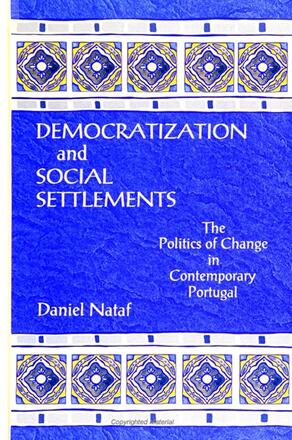
Democratization and Social Settlements
The Politics of Change in Contemporary Portugal
Alternative formats available from:
Examines the transition to, and consolidation of, democracy in Portugal following the revolutionary events of 1975, during a period of major changes in socioeconomic structure. Nataf emphasizes that not only political institutions but also the fabric of social relations were uprooted, and he compares the Portuguese case to other models of European democratization and postwar settlements.
Description
This book examines the transition and consolidation phases of Portugal's democratization. Unlike more incremental types of democratization, the Portuguese case involved "expanded" democratization in which not only were political institutions replaced but the fabric of social relations uprooted. This resulted in a period of dishegemony in which the policy paradigm was uncertain and highly susceptible to political events and government initiatives. By the late 1980s, a tentative social settlement was established that drew partly from neocorporatist and partly from conflict models of European society.
Nataf relies on diverse materials including government statistics; business, trade union, and party documents; and electoral, census, and survey materials to substantiate his interpretation of the political and social consensus emerging throughout the 1980s. He uses the Portuguese experience to generate a typology of forms of democratization and then applies this analysis to the post-communist world.
Daniel Nataf is Assistant Professor in the Department of Political Science, University of Maryland, Baltimore County. He is the coauthor of Transitions from Dictatorship to Democracy: Comparative Studies of Spain, Portugal, and Greece.
Reviews
"This constitutes the first book-length study of the Portuguese transition within a political economy framework that situates the country properly in its international economic and political setting and that incorporates fully a discussion of the relevant social and economic groups. The book's major contribution is to demonstrate how the Portuguese case, which is one of the most significant ruptures with the prior polity and economy, ultimately has led to the consolidation of a democratic regime and a market economy. " — Lawrence Graham, author of The Portuguese Military and the State: Rethinking Transitions in Europe and Latin America"
This book is rich in empirical detail and at the same time develops an interesting and highly abstract theoretical argument. The author's command of the intricacies of Portuguese politics is obvious. " — William Crowther, University of North Carolina at Greensboro